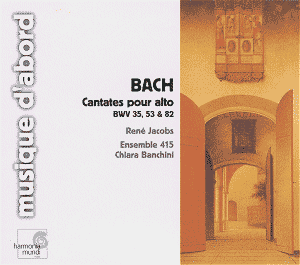Harmonia
Mundi has the excellent idea of re-releasing certain of their
most popular recordings as "catalogue" CDs each year. The latest
such release is this disc containing three alto cantatas. René
Jacobs, an excellent alto, is featured here with Ensemble 415.
The
recording contains three cantatas: BWV 35, BWV 53 (which is spurious,
and was probably written by G. M. Hoffman), and BWV 82, one of
Bach's best-known cantatas, which is usually sung by a bass or
baritone. In the liner notes, it is pointed out that a version
of this cantata exists for alto, though it is scored for flute
instead of oboe. Jacobs gets the best of both worlds, singing
this fine work in his range and keeping the excellent oboe.
This
disc is a paradox: with some excellent singing and music, it features
very harsh sound, with little warmth or depth. The unflattering
acoustics of the church where these works were recorded detracts
somewhat from the two orchestral movements in BWV 35. The balance
between voice and instruments is not always very good, and at
times Jacobs' voice is drowned out by the music. He sings BWV
35 rather unsurely, his hesitation coming through even over the
plodding sound of the instruments in the long aria Geist und Seele.
The mixture between voice and instrument is more effective in
the second aria, Gott hat alles wohlgemacht, where Jacobs sings
accompanied by a very attractive small organ.
Hearing
cantata BWV 82 sung by alto is indeed a surprise. Used to hearing
basses and baritones, such as the great recording by Dietrich
Fischer-Dieskau, the sound of René Jacobs just doesn't
do it for me. The airiness of his voice contrasts too much with
the intense grounding this work calls for. In addition, the deep
sound of the oboe obbligato in the opening aria overtakes the
alto voice, being much deeper and louder, putting the oboe in
the forefront and Jacobs in the background. This is a shame -
a flute would have been a much better counterpoint to an alto
voice here, and would have created a radically different tone
overall. Jacobs is more effective in the second aria, Schlummert
ein, ihr matten Augen, which is played at a slow tempo. His voice
works better with the overall sound of the orchestra, but his
is again often drowned out by the accompaniment.
The
cantata BWV 53 is a strange work. It is clearly not by Bach, because
he never wrote a cantata where all the parts are in one movement
(it is just a single da capo aria), nor did he even use an obbligato
bell. It does not even sound much like Bach's vocal works. This
is relatively uninteresting and Jacobs does not sound very moved
as he sings it.
In
addition to the above comments, René Jacobs unique vocal
colour is certainly not something that all listeners will appreciate.
His voice tends to fit with certain types of music, and I find
it out of place here with these intense cantatas.
This
disc will be of interest, especially for its low price, to those
curious to hear Ich habe genug sung by an alto, or by those who
like René Jacobs. Aside from these two reasons, there is
little on this disc to interest the casual listener. A far better
recording of BWV 82 is the landmark version by Fischer-Dieskau.
Kirk
McElhearn
